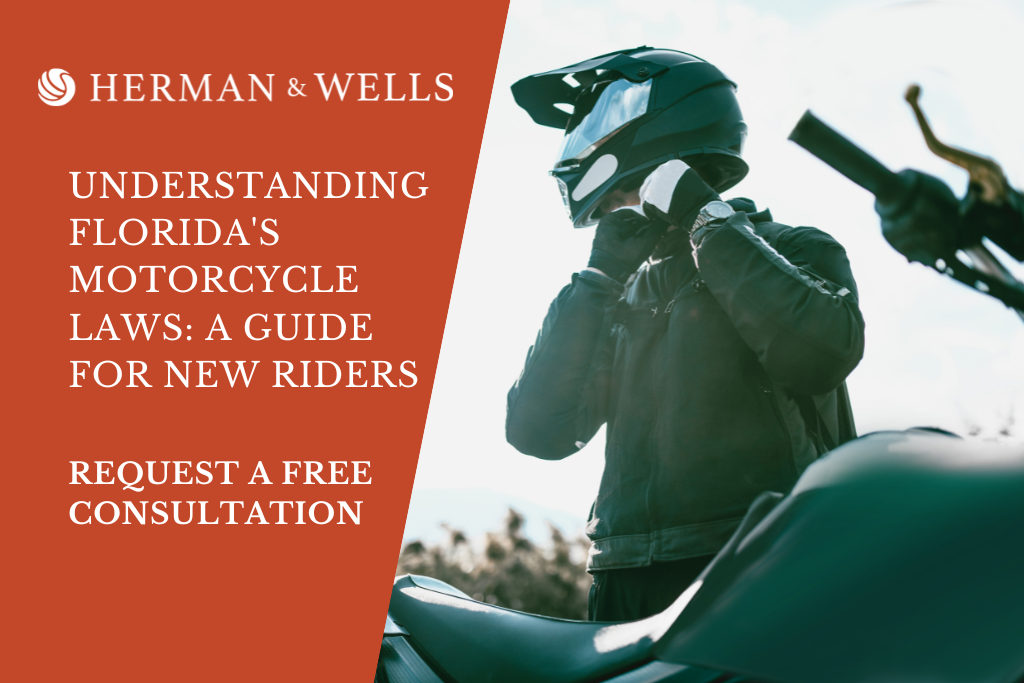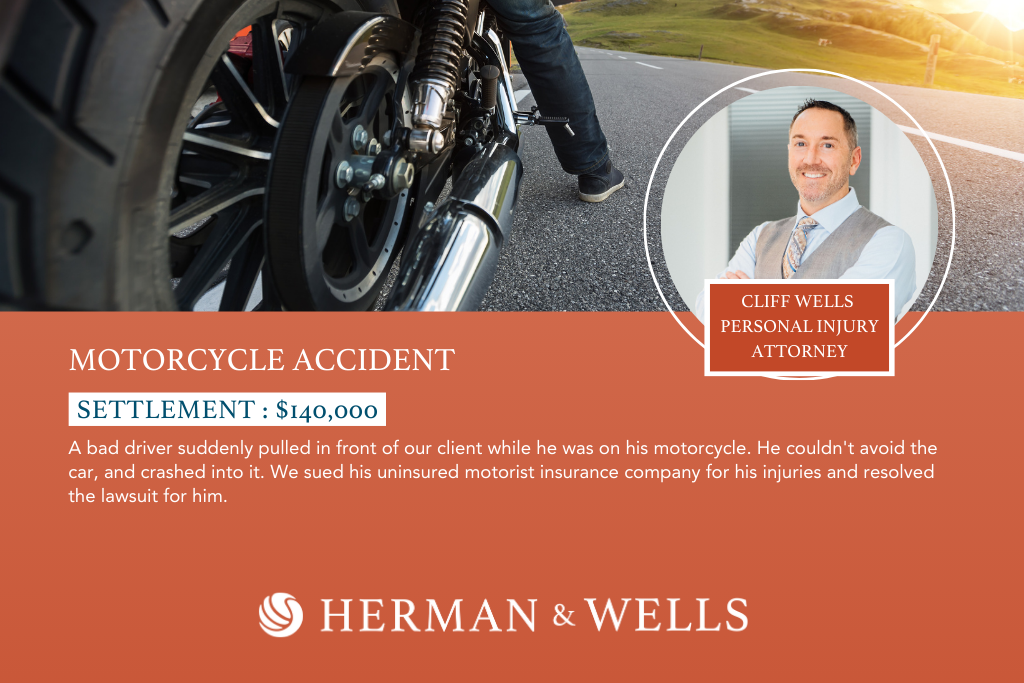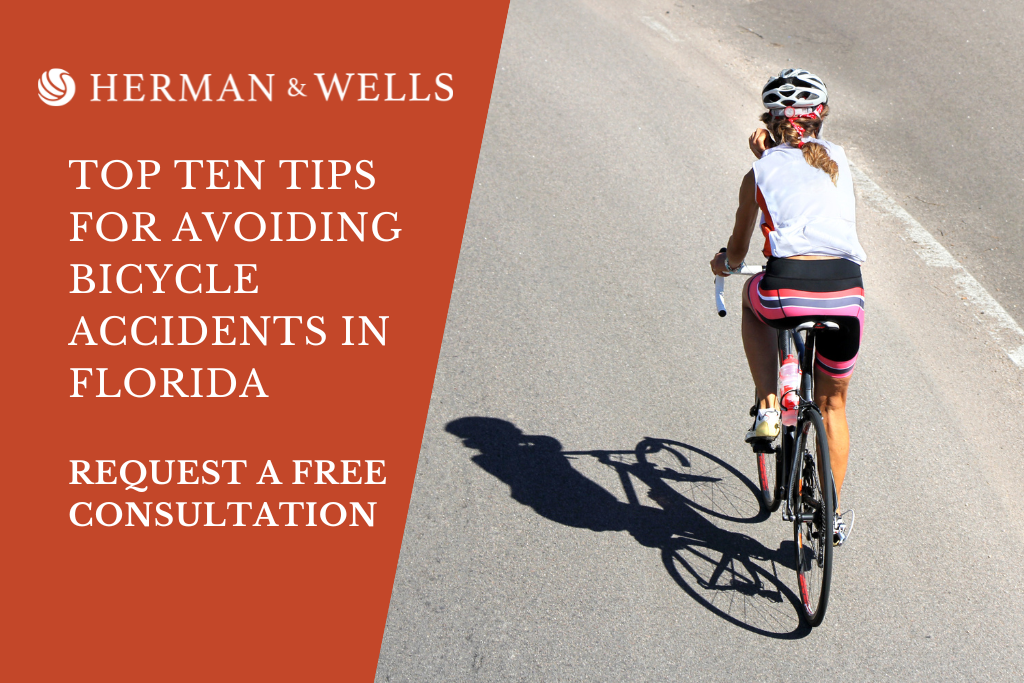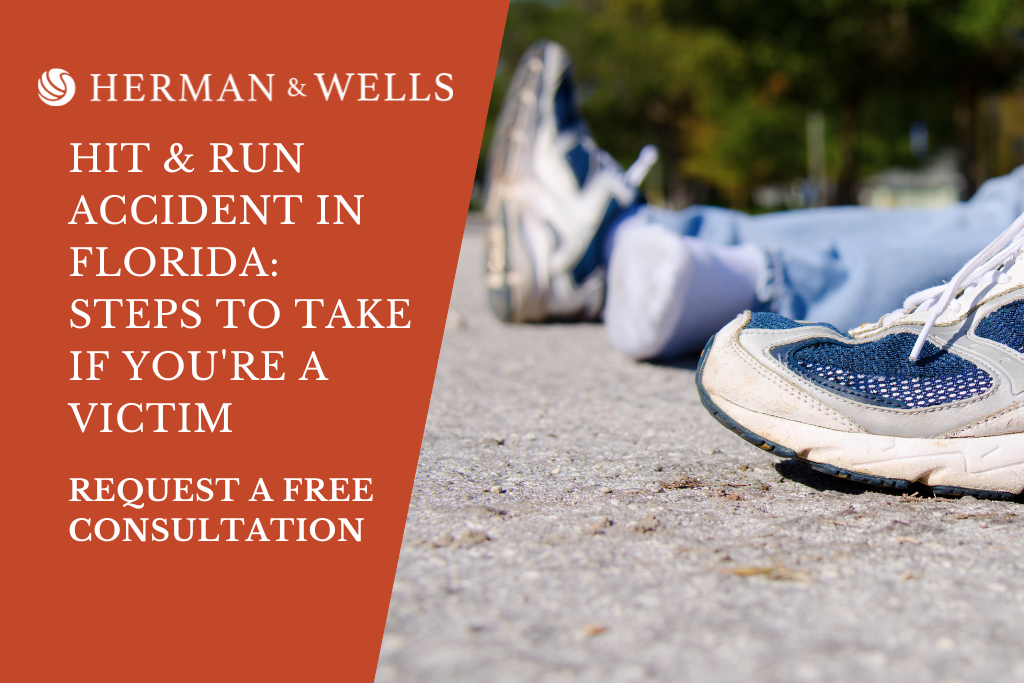Are you a new motorcycle rider residing in Florida? Understanding and following Florida’s motorcycle regulations is crucial for a safe riding experience and accident prevention. In case of a crash, knowledge of Florida’s motorcycle laws is essential for handling legal matters.
If you’ve been injured in a motorcycle accident, it is strongly advised that you get the help of an experienced motorcycle accident lawyer. Contact Herman & Wells at (727) 821-3195 for the best legal representation and expertise.

The Cliff Notes: Key Takeaways From This Post
- 1If you are over 21, wearing a helmet is optional as long as you carry at least $10,000 in medical coverage.
- 2To obtain a motorcycle endorsement, you must complete the Basic Rider Course if you have a driver’s license, or satisfy various requirements for a motorcycle-only license.
- 3Motorcycles must adhere to specific equipment standards to guarantee roadworthiness and safety.
- 4Lane splitting is explicitly unlawful in Florida, underlining the state’s commitment to a safe and structured traffic environment.
- 5Insurance is mandatory for motorcycles, with minimum coverage requirements set to safeguard both riders and other road users.
- 6Contact the motorcycle accident lawyers of Herman & Wells at (727) 821-3195 if you’ve been injured in a motorcycle accident.
How Motorcycle Laws Differ From Other Vehicle Laws
Motorcycle laws in Florida differ from other vehicle regulations due to their targeted focus on the unique risks motorcyclists face on the roads. They are specifically designed to ensure the safety and awareness of riders, taking into account the inherent vulnerabilities that come with operating a vehicle that provides less physical protection than cars or trucks.
The Basics Of Florida Motorcycle Laws
To learn the legal landscape of motorcycle laws, it’s crucial to start with the basics – understanding Florida’s perspective on what constitutes a motorcycle. Surprisingly, Florida’s definition goes beyond traditional two-wheelers. According to Florida law, a motorcycle can encompass any two- or three-wheeled vehicle with a seat or saddle, any motorized vehicle operable without pedaling, and any gas-powered scooter or moped above a specific engine size.
Licensing Requirements For Motorcycle Riders In Florida
Gaining the privilege to ride a motorcycle starts with the proper licensing process. In Florida, there are two main pathways to demonstrate your motorcycle expertise: either by adding it to your regular driver’s license or obtaining a dedicated motorcycle license. To pursue the former, successfully completing the Basic Rider Course provided by the Motorcycle Safety Foundation is a must. Opting for the latter requires passing a knowledge exam in addition to finishing the Basic Rider Course.
The distinction between a general driver’s license and a motorcycle-specific endorsement highlights the unique skills and knowledge riders need to safely operate these special vehicles. Florida’s emphasis on comprehensive training reflects its dedication to nurturing a community of skilled motorcyclists.
Helmet And Safety Gear Regulations In Florida
The debate surrounding mandatory helmet use continues, with Florida taking a balanced stance. While allowing adults above 21 the choice, the state upholds their freedom while also mandating a practical measure – a minimum of $10,000 medical coverage insurance for those opting to ride without a helmet.
However, this freedom comes with restrictions; individuals under 16 must wear helmets at all times to prioritize their safety. In addition to head protection, Florida mandates the use of eye gear like face shields, goggles, or glasses.
Traffic Laws Specific To Motorcycles In Florida
Lane Splitting And Sharing
Motorcycle laws encompass more than just equipment and licensing; they also include guidelines for rider behavior on the road. In Florida, lane splitting is explicitly prohibited, ensuring that motorcyclists have the entire lane to themselves for safety reasons, eliminating the uncertainties of sharing a lane with other vehicles.
Signal And Turning Regulations
Additionally, Florida has stringent regulations for signaling and turning for motorcycles, requiring riders to adopt a proactive communication approach when interacting with other vehicles. Consistently signaling and making predictable movements are essential in reducing the risk of accidents.
Motorcycle Equipment Standards In Florida
Floridian roads host a variety of vehicles, with the state enforcing stringent regulations on the maintenance and visibility of motorcycles. Whether it’s lighting or brake systems, the components on your motorcycle are crucial for road compliance. Neglecting these standards can result in avoidable accidents and legal issues, underscoring the importance of adherence.
In addition to meeting legal requirements, fostering a safety-focused culture involves regular upkeep and investing in top-notch gear. Consider these regulations as guiding principles to enhance safety, rather than mere obstacles to overcome.
Handlebar Height
In Florida, it is mandated by law that a motorcycle’s handlebar or hand grips should not be higher than the rider’s shoulders when seated. This rule ensures that riders effectively control and steer their motorcycles, thereby reducing the risk of accidents caused by handling difficulties. When the handlebars are too high, it places a strain on the rider’s shoulders, neck, and wrists, complicating the navigation of turns and overall steerage.
Muffler Requirement
Furthermore, Florida law insists on proper mufflers on motorcycles as a requirement to control noise. Mufflers play a key role in reducing the noise levels of motorcycle engines, promoting a harmonious relationship between riders and other road users, and keeping communities peaceful. Use of muffler cutouts, bypasses, or similar noise-amplifying devices are strictly prohibited and can lead to legal consequences in addition to causing unnecessary disturbances to fellow motorists and residents.
Insurance Requirements For Motorcyclists In Florida
Contrary to the requirement for four-wheeled vehicles, in the state of Florida, motorcyclists do not need to provide proof of insurance to register their motorcycles. However, they are responsible for any injuries caused in an accident. Hence, acquiring a liability policy is a wise move. This financial responsibility is typically demonstrated in Florida by purchasing liability insurance with specific minimum limits:
- $10,000 in bodily injury per person
- $20,000 in total bodily injury per accident,
- $10,000 in property damage per accident.
As mentioned earlier, motorcyclists who are 21 or older and choose not to wear a helmet, are required to have a minimum medical coverage of $10,000. This can be sourced through a health insurance plan and doesn’t necessarily have to be a dedicated motorcycle insurance policy. For motorcyclists over the age of 21 who do wear a helmet, there is no obligation in Florida law for medical benefits protection.
Florida’s DUI Laws For Motorcyclists
Florida’s laws regarding Driving Under the Influence (DUI) for motorcyclists are as stringent as those for other vehicles. Riders with a blood alcohol content (BAC) of 0.08 or higher, or those without full control of their normal faculties can be charged with a DUI. Keep in mind that the state doesn’t tolerate drunk driving, whether you’re behind the wheel of a car or riding a motorbike.
The state of Florida doesn’t go lenient when penalties for DUIs come into play. Consequences can extend to hefty fines, possible jail time, license revocation, and potentially the requirement of an ignition interlock device at the rider’s expense. Moreover, Florida’s implied consent law stipulates that by holding a license, motorcyclists have already agreed to undergo a BAC test when requested. Refusing this test could land you a $1,000 fine or even a year-long jail term.

Age-Specific Motorcycle Laws In Florida
In Florida, there isn’t a definitive age limit for individuals to be passengers on motorcycles. However, the motorbike must be specifically designed and equipped to accommodate passengers. This specifically implies that a suitable seat and footrests must be provided to ensure a comfortable and secure ride for the passenger.
Furthermore, Florida laws dictate a protective measure for younger passengers. Any passenger who is under the age of 21 is legally obligated to wear a helmet while riding on a motorcycle.
How Certain Florida Laws Help Prevent Motorcycle Accidents
Each law and regulation plays a crucial role in motorcycle safety. While they may appear as mere legal requirements individually, together they stand as a strong symbol of Florida’s dedication to fostering a safe and harmonious environment for motorcyclists.
Law Awareness And Accident Prevention
Complying with these laws goes beyond avoiding fines; it is about nurturing a culture of safety and mutual respect on the roads. Understanding and abiding by these regulations can quite literally mean the difference between life and death.
Involved In A Florida Motorcycle Accident? Call Herman & Wells
Understanding Florida’s motorcycle laws is crucial, but even with the utmost vigilance, accidents can still occur. In such cases, it’s vital to promptly engage an experienced and dedicated motorcycle accident lawyer, like those found at Herman & Wells. We recognize the unique road challenges that motorcyclists face and are fully prepared to safeguard your rights and pursue the compensation you’re entitled to.
In the aftermath of an accident, seeking professional legal assistance should be your priority. Our lawyers at Herman & Wells are ready to handle every aspect of your claim, leaving you to focus solely on your recovery. Reach out to us today for a free consultation at (727) 821-3195. With our expert help, you can make it through this difficult time and get back on your feet.





